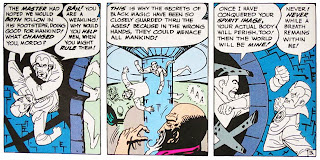The Story I read: “The Coming of the Avengers” (The Avengers #1 Sept, 1963)
 |
| Even the cover feels reverential. |
It occurred to me today that my readers on the Marvel wikia are in the dark as to the reason I decided to launch this journey through the complete Marvel comic universe. As my blog followers are already aware, I am an avid DC fan and write often for a lot of fan blogs on DC related topics, particularly Hellblazer. Recently, I became interested in some of the work of Marvel, namely the additions to X-Men, which stirred in me a want to become more familiar with the Marvel Universe as a whole. Not knowing where to start, I plunged into the full comic library and began to write reviews for each one. That was 72 issues ago.
If there is checkpoints in this quest, the premiere of the Avengers would be the first. It is this moment that a loose knit group of ragtag characters became beings that inhabited a whole far reaching world. Sure, there had been crossovers before this, but they always seemed to be special events that were often hastily written exhibitions stemming from fan requests. This issue, however, is the moment that showed Stan Lee, Jack Kirby and the other Marvel creatives wanted to construct a vast comic gallery that would be able to compete with the massive and older DC counterpart. Reading this story felt almost like a religious moment; if comic fandom could be considered such.
This story reveals a glimpse into how the Silver Age Marvel world works. On the face of this, it is a caper flick, not unlike The Dirty Dozen. A group of rag tag Superheros come together to defeat a common enemy.
Thus enters the Incredible Hulk.
...Wait a minute. The antagonist is actually Loki. Never mind that, neither Ant-Man, Wasp, or Iron-Man can pose any threat to the trickster god so only Thor confronts him. The rest pursue the supposed villainous Hulk only to find out that he is not such a bad guy. He’s just a circus performing monster who was the victim of an Asgardian plot. I waster 20 pages on this? Is not every Hulk story to date?
This is the problem of Hulk and probably the reason for his lack of success in the period; he is too believable as the villain. He is a selfish, violent monster, who is out for his own survival. Not to mention he is a malady to Bruce Banner. Hulk is difficult to spin as a legitimate hero, for he lacks humanity and a moral code, the two prerequisites for a superhero. It is telling that the Disney Marvel film franchise has had such trouble translating the character to film, till Joss Whedon of course figured it out by making Jekyll and Hyde one: “I’m always angry.” - Says Mark Ruffalo’s Bruce. In the Silver Age, Hulk was not the result of rage as depicted in modern Marvel but is a character that bares more resemblance to Jekyll/Hyde. Perhaps, it was pages devoted to Thor’s solo adventure that happened proper development for Big Green.
Thor’s contribution to this story bares more similarity to an issue of Journey Into Mystery then as a team up with the Avengers. The moment he found out that Loki had a plot to capture him he flew away to Asgard to fight. The three others duked it out on Earth. This is not the actions of a team mate. There is no group cohesion in this story and I blame it on haphazard writing. The group comes together out of happenstance which results in a themeless issue. Weirdly, this is not the case with the film, which was vaguely inspired by this plot, because of the creation of the S.H.I.E.L.D. assemblage.
I felt empty at the end of what should have been a fantastic experience.
I also wonder why it was these five characters that were chosen to be a part of the first Avengers crew. It makes sense that Dr. Strange is not included as he has only had two stories devoted to him by this point and frankly they were very odd. I doubt Stan Lee intended the good Doctor to be a common fixture. The Fantastic Four, though creatively mentioned in the story, have really nothing to do with the creation of the Avengers. This is strange as some time has been spent making the Four (particularly Jonny Storm) the flag ship line. Perhaps, their was a fear that the Four’s egos, the topic of my last review, would over power these less established characters. I for one would have enjoyed a Tony Stark comic lashing of Thing. I know it will come in the future.
Overall, this is a very messy issue with some really great action with Hulk, and some brilliant use of Ant-Man and Wasp, also some wonderful art by Kirby. Yet, there is an absence of Iron-Man, wasted focus on Rick Jones and his Teen Brigade, and confusion as to the plot. I give this one a 3 out of 5. I flirted with a lower mark but it felt sacrilegious as this Issue is so important and a gamble of an undertaking. This makes the endeavour as a whole, respectable.


